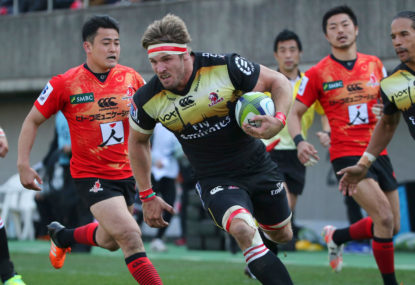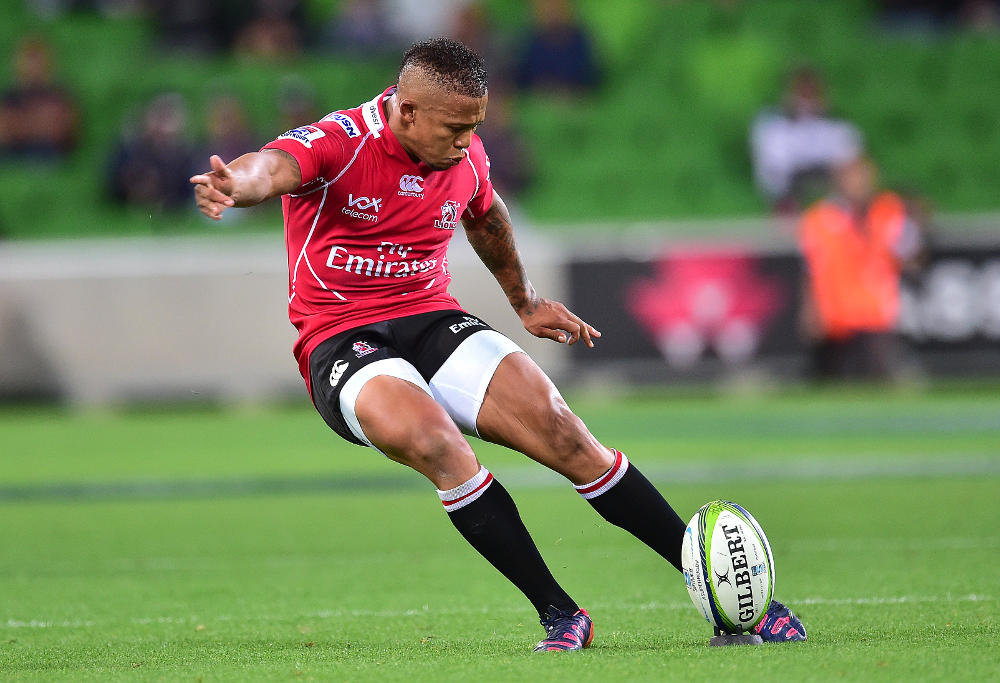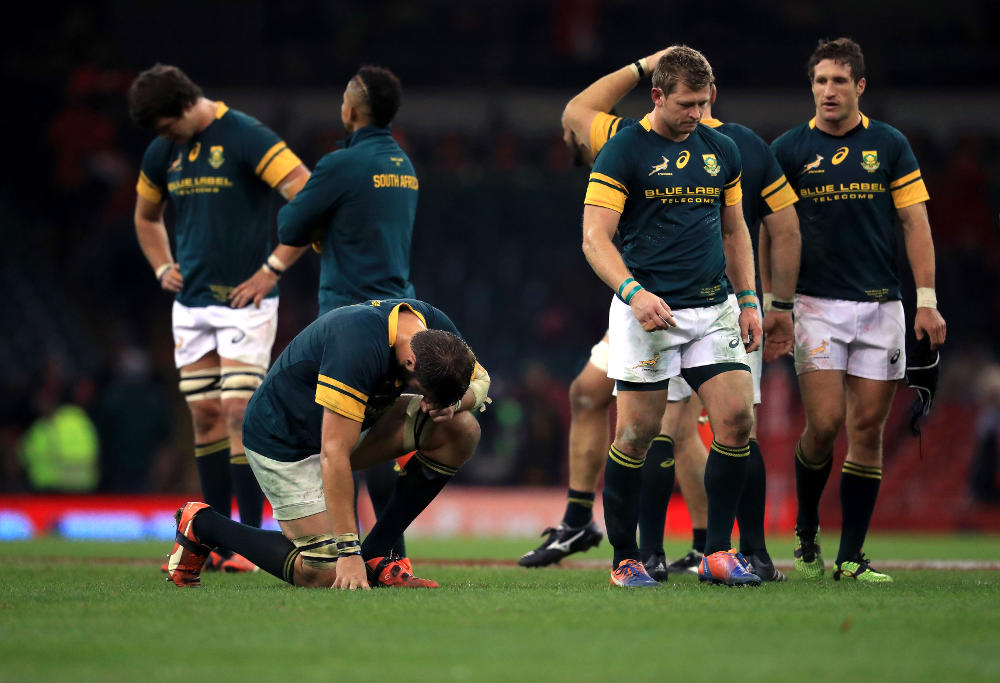The game they play in heaven: A 'Dream XV' made up of unforgettable players
Unfortunately, the only criteria for this Dream XV are that you had to have passed away. During my research, I thought of potential players…

As another year draws to a close, with the flow of the sands of time as unremitting as ever, it’s time to introspect.
We look forward to another year of hard hits, great tries, reset scrums, the Southern Kings, a spurt of trans-Tasman ‘love’ around mid-August, and Dean Mumm in 2017.
In the meantime, let’s look back at the year that was for SANZAAR.
Click here to read Part 1: Argentina
Click here to read Part 2: New Zealand
The year that was
What just happened here?
Springbok fans, and rugby fans in general were made to look like helpless bystanders witnessing a shoddily erected skyscraper collapse in a heap of rubble.
While 2015 saw the ignominy of the defeat to Japan in the Rugby World Cup, that was at least tempered with the consolation of a third-placed finish. Of course, even that would never have been enough to meet the lofty expectations of Springbok fans, but compared to this annus horribilis, 2015 seems like paradise.
Let’s start with the lesser of the two evils. The 2016 Super Rugby season.
As we all know, the format for Super Rugby underwent a change this year, as the former South African conference of 5 teams was expanded into two conferences of 4 teams each – with the 3 extra teams being the Southern Kings, Japan’s Sunwolves, and Argentina’s Jaguares.
This tweak to the format was evidently favourable to South African sides as it virtually assured at least 2 teams from South Africa would take part in the eight-team finals series (ultimately 3 made it).
However, this was both a boon and a bane, as when the finals came around, the winners of the conference that had not played any sides from New Zealand, the Stormers, were woefully unprepared for what was coming their way when they faced the Chiefs at home.
A 60 points to 21 drubbing would not be the last time a Kiwi team humbled a South African side at home.
The saving grace of the Super Rugby season, and of 2016 as a whole for South Africa, was the breath of fresh air in the form of Johan Ackermann’s Lions.
After returning to Super Rugby in 2014 by means of winning a playoff, the Lions had bided their time over two seasons, building a hybrid Kiwi-Saffa style of uncompromising forward play and ambitious attack. They would unleash this to its full potential in 2016, first coming to notice by surprising the Chiefs in Hamilton 36-32, and then dominating their opposition in South Africa.
However, a gamble by Ackermann in the last round of the regular season, choosing to rest his first team players from a trip to Argentina ahead of the first quarter-final against one of the New Zealand sides, resulted in the Lions not topping the Super Rugby table outright.
This meant that they had to travel to Wellington to face the Hurricanes in the grand final.
The Lions reached the final by virtue of two great performances against the Crusaders and the Highlanders at home, but defeating a Beauden Barrett-inspired Canes outfit in the wind and rain of Wellington proved to be a step too far. They lost 20-3.
And so that fairytale ended. And thus began the nightmare. The nightmare that was the Springboks’ season.

Out of respect for Springbok rugby I shall not go into the gory details of the season, but a few highlights, or should I say lowlights, of the year.
There are three that stand out.
The first match of the season against Ireland sans Jonathan Sexton which would then become a match against a 14-man Irish side. The final match of the Rugby Championship, confirmation that the gap between the All Blacks and Springboks is at an all-time high.
Then the worst of the lot, the loss to Italy in Florence, the cradle of the Renaissance would strike one of the death knells of Springbok rugby as we know it.
In contrast to the Wallabies’ season of woe, there were no fluctuations in the Springboks’ fortunes.
After they salvaged the series against Ireland, there would be no more illusions of hope, simply disappointment after disappointment. The double-header against the Pumas were both matches they could have lost or won on fine margins, but neither of those games showed any good promising Springbok performances.
The blast from the past against the Wallabies at Loftus Versfeld was too little, and far too late, insofar as that brand of rugby is an anachronism, it just won’t be enough in this era. The All Blacks would prove that the next week in Durban.
Even the non-test matches did not go to plan, as the tour game at Wembley against the Barbarians, which featured a mostly third choice line-up with plenty of debutants, needed a last minute Rohan Janse van Rensburg try to salvage a 31-all draw.
The South Africa A squad was also beaten by its English counterparts, the Saxons, over two matches in June at home.
To summarise
The warning signs of 2015 gave way to something akin to an apocalyptic flood in 2016.
Just four victories, all of them at home, out of 12 Test matches. A first ever defeat to Ireland at home, a first ever defeat to Argentina in Argentina, and a first ever defeat to Italy. 2016 was a year to forget.
The positives
From a Springbok perspective, I am hard pressed to find any positive at all. The Boks showed some signs of fight when they bounced back in the second half of the second Test against Ireland, with the Irish wilting at altitude.
They would also show resilience to snatch a late victory against Argentina, while they showed good defensive nous to keep Australia scoreless for most of the match at Loftus Versfeld.
Some of the Lions players brought up to the test side impressed, most notably Jaco Kriel and Warren Whiteley, while others were less than impressive.
As such, the Lions were really the only positive thing regarding South African rugby this season. Finally, we saw a team from South Africa that can go toe to toe with the best that New Zealand has to offer.
If they can keep their core players from moving off to greener pastures in Europe and Japan, then there is no reason to think that they will not continue to be South Africa’s best bet at getting the Super Rugby crown back to the Republic.
However, in 2017 they will not face any New Zealand opposition in the regular season, so they must go all out to secure top spot in the overall standings and ensure they do not leave South Africa during the finals.

What went wrong?
Normally I would classify this section as the negatives, but really, if we look for negatives in this season we would find ourselves staring at the season as a whole. So I’m going to try and look at just what went wrong with the Springboks in 2016.
The elephant in the room here is the coaching staff.
Allister Coetzee replaced Heyneke Meyer after having coached the Stormers for five years. Although he had led his team to the Super Rugby final in 2010, since then the Stormers had consistently reached the latter stages only to be disappointed. His last game for the Stormers was the 39-19 knockout defeat at home by the Brumbies in 2015.
Now while we may consider that the SARU would have had a few of their transformation goals in mind while appointing a ‘coloured’ man to replace an outgoing Afrikaner as head coach, there can be no doubt about their intentions in their appointment of 32-year-old Mzwandile Stick as the backline coach.
Stick was a player for the Southern Kings as recently as 2013, and even as the backline coach for the same side he hardly had enough experience or track record to warrant being appointed as national coach.
It is this sort of poor administration that has blighted South African rugby on so many levels, and it has finally started to tell on the national team’s results too.
Coetzee’s gameplan has been an unsure mix between antiquated crash ball and progressive attack, with the end result being something which is the exact opposite of the best of both worlds. Towards the end of the season, Coetzee did what Heyneke Meyer was forced to do towards the end of his four years in charge – go back to relying on old players and old tactics.
In a way, Meyer’s reluctance to trust his youngsters completely in his time is also responsible for the situation the Springboks find themselves in now, with Coetzee having to blood in numerous youngsters on the November tour, with many of them too inexperienced to carry the team to victory.
The Lions players he brought into the side in June also lost all momentum they had in Super Rugby, especially Lionel Mapoe and Elton Jantjies, since it was clear he was not going to adopt the same game plan for the Springboks.
The players themselves are naturally to blame as well.
Coetzee’s captain, Adriaan Strauss, who has retired after this horror season, was one of the most passive captains in recent memory, barely being the first name on the teamsheet based on his performances.
The Boks also sorely missed Handré Pollard this year, as Elton Jantjies found it hard to replicate his Lions performances in the Springbok shirt. Ruan Combrinck too was lost for a major part of the year thanks to injury after being the standout player in the series against Ireland.
Player of the year
No player really stood out across the entirety of this miserable season for the Springboks, but some of the better ones were Ruan Combrinck, Warren Whiteley, Pieter-Steph Du Toit, Bryan Habana, and Pat Lambie.
Among these, I would give the player of the year to Combrinck. The young Lions winger is a real talent who promises to have a long career in the Springboks jumper, provided he can stay fit and play in South Africa for a long time.
Try of the year
They didn’t score too many tries this year, but the five-pointer from Bryan Habana against the Pumas in Salta involved a great piece of skill from Francois Louw (and a possible forward pass?).
How many more times will we see Bryan Habana score in a Springbok shirt? He just needs three more to overtake Daisuke Ohata on the list of all-time top try scorers. Enjoy him while you can.
Performance of the year
Well, out of four wins this season, easily the best one was the second Test against Ireland, even if it actually just had 40 minutes of defiant Springbok rugby at its best.
Looking ahead
A record like Coetzee has racked up in his first year in charge would normally be enough to see him given the boot, but the SARU are going to persist with him.
His challenge will be to continue juggling three things: continued transformation, evolving style, and most importantly, getting results.
It all depends on results. The fans have already lost patience and faith, but the results will not come if the team continues to play like they have this season under his tutelage. It is a proper chicken and egg situation, and the continued player drain to Europe will not make things any easier.
The SARU organised two coaching “indabas” this year, where they gathered coaches from all provinces along with referees and the national staff to discuss and collaborate on the direction South African rugby wants to head in.
Coetzee said that he was happy with the first indaba in October, citing four major points that were discussed. These were – execution of kicks, improving aerial skills to contest the kicks, improving defence and improving a skill set to fit in with the attacking gameplan he has in mind.
Coetzee emphasised having a balance to your attack and not being reckless, but considering the floundering attack the Springboks have had this season, it is hard to imagine them being so ambitious as to be reckless in the future.
There was also a conditioning indaba held earlier this month, which focused on establishing physical standards for players to prevent them from wilting in the final minutes of Test matches, as they did when they conceded four tries in the last ten minutes at Durban against the All Blacks.
The Springboks and their fans need to understand that this is a long road to redemption, and there is no quick fix to this mess.
As long as politics meddles in rugby, and the administration has issues at the very deepest levels, the Springboks will find it hard to reach the heights they reached in the past. If Coetzee is sacked or resigns next season then he will be replaced by someone with an equally as incompetent coaching staff, and the Boks will face the same problems they faced in 2016.
The verdict
I think a spin on a popular schmaltzy phrase sums up the outlook Springbok fans should have with regards to 2016: “Don’t cry because it happened, smile because it’s over.”
Unfortunately for them, I don’t think their ordeal will be over with 2016. Oh well, at least they won’t lose to Italy.